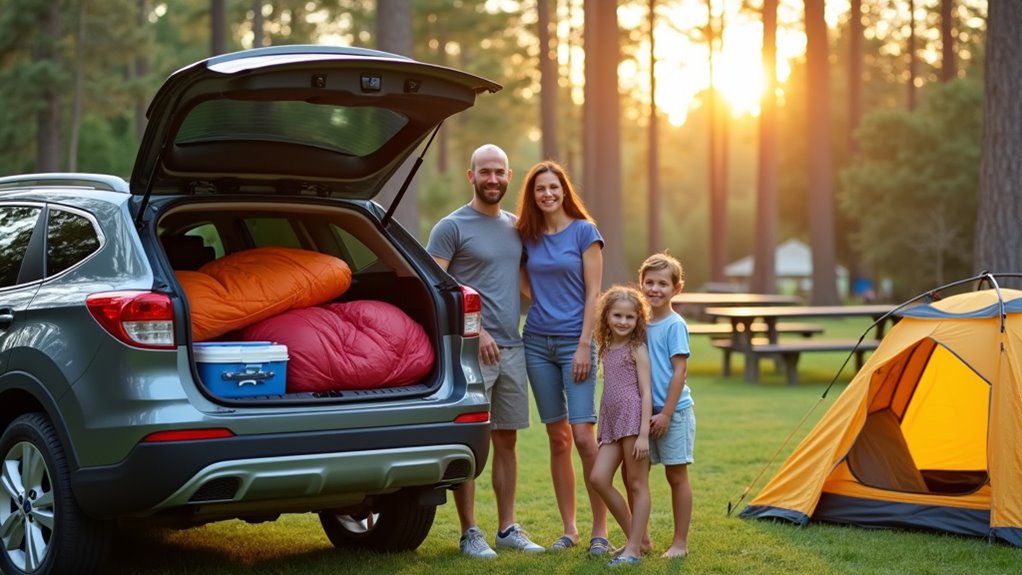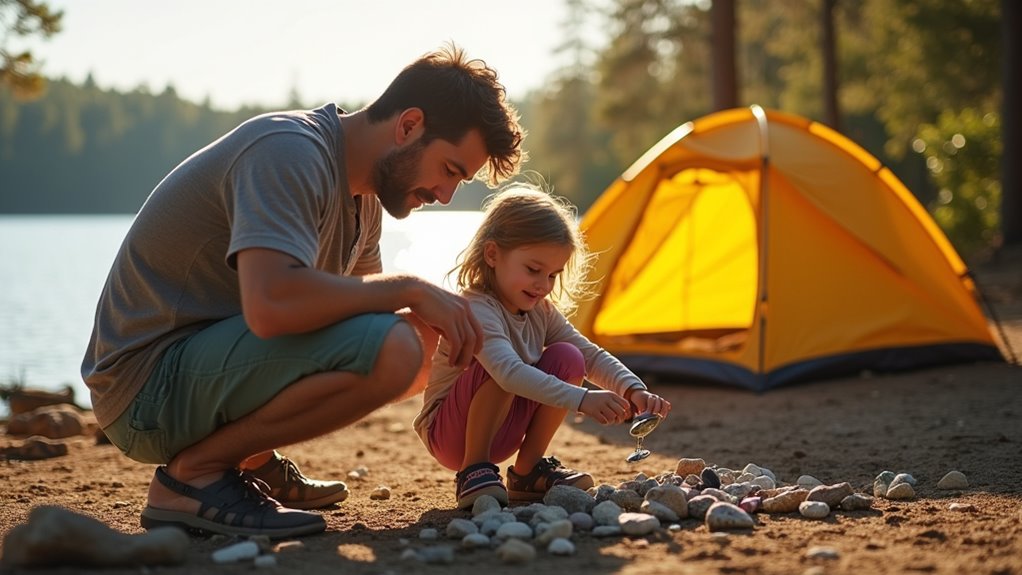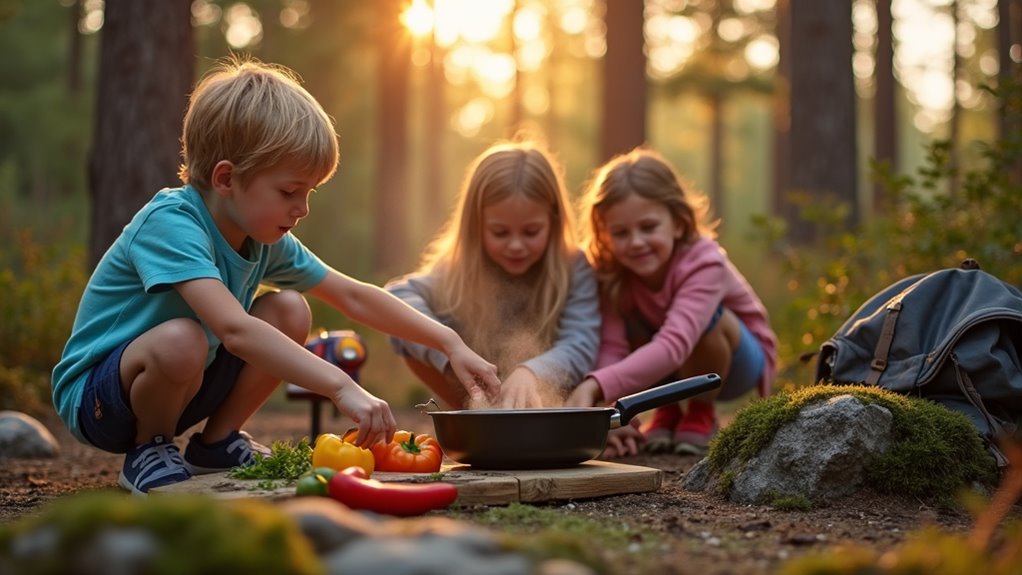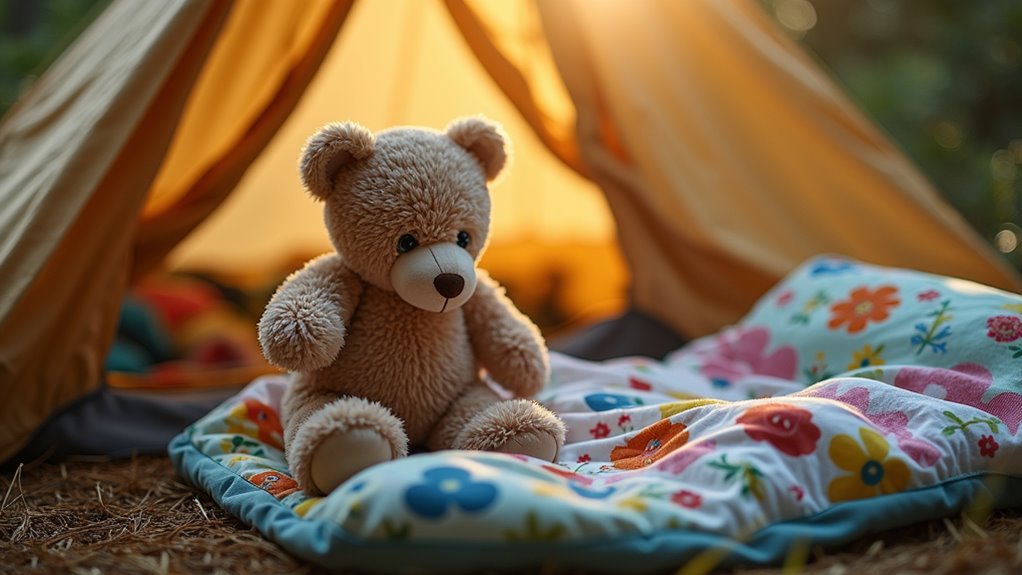Physical Address
304 North Cardinal St.
Dorchester Center, MA 02124
Physical Address
304 North Cardinal St.
Dorchester Center, MA 02124

Kids hate camping until you try these 8 game-changing strategies that transform screen-obsessed children into eager outdoor adventurers.
You want your kids to beg for the next camping trip instead of dreading it, but right now they’re probably more interested in their screens than sleeping bags. The good news? You can transform reluctant campers into outdoor enthusiasts with the right approach. It’s not about forcing them into the wilderness—it’s about making smart choices that turn camping into their favorite family adventure. Here are eight proven strategies that’ll have them packing their bags before you even ask.

When you’re introducing kids to camping for the first time, car camping offers the perfect middle ground between home comfort and outdoor adventure. You’ll have easy access to your vehicle if someone forgets essential items or needs a quick snack. Plus, restrooms and water sources are typically nearby at established campgrounds.
Car camping lets you pack more comfort items without worrying about weight restrictions. Bring extra blankets, favorite stuffed animals, or portable chairs that make the experience more enjoyable.
If weather turns nasty or kids get overwhelmed, you can retreat to your car for shelter. Having proper rain gear prepared will help ensure everyone stays dry and comfortable during unexpected weather changes.
This approach builds confidence gradually. Once your children master car camping basics like setting up tents and camp cooking, they’ll be ready for backcountry adventures with enthusiasm rather than anxiety.
Giving kids ownership over their camping gear transforms them from reluctant participants into excited adventurers. When children select their own sleeping bags, flashlights, and camping accessories, they develop personal investment in the experience.
You’ll notice their enthusiasm spike as they pick out colorful headlamps, fun-patterned sleeping bags, or cool water bottles. Set a reasonable budget and let them browse camping stores or websites together. They’ll feel proud carrying gear they’ve chosen and take better care of items they’ve personally selected.
Don’t worry if their choices prioritize style over technical specs—a bright pink sleeping bag that excites your daughter works better than the “perfect” one she doesn’t want to use. This ownership creates positive associations with camping that’ll last for years. Teaching them basic camping terms alongside their gear selection helps them feel more confident and prepared for the outdoor adventure ahead.

Why do some kids bounce out of their tents at dawn while others complain they’re bored before breakfast? The secret lies in matching activities to your child’s developmental stage and personal interests.
Tailor your camping adventures to what genuinely excites each kid. Nature photographers love scavenger hunts, while budding scientists can’t resist collecting specimens. Athletic kids thrive on hiking challenges, and creative ones enjoy campfire storytelling.
Consider these age-specific approaches:
For older teens seeking the ultimate outdoor challenge, consider introducing them to glacier climbing on some of the spectacular trails found throughout the United States.
You’ll transform potential complaints into genuine enthusiasm when activities align with their natural curiosities and abilities.
Since kids crave predictability even in new environments, establishing unique camping rituals gives them something special to anticipate on every trip. You’ll find they get excited knowing certain activities happen only during camping adventures.
Start with simple traditions like making the same breakfast on your first morning or telling spooky stories around the campfire on your last night. Let each child choose their own special camping snack that’s off-limits at home. Create a family camping song or designate specific roles for setting up camp.
Consider starting a camping journal where everyone writes or draws memories from each trip. You might establish “wilderness names” that only get used outdoors. When packing for your adventure, involve kids in deciding what items to leave at home to keep your camping gear manageable and focused on the essentials. These rituals transform ordinary camping moments into treasured family memories your kids will cherish forever.

How can you turn mealtime into an adventure that rivals any hiking trail? Getting your kids involved in meal planning and outdoor cooking transforms them from passive participants into enthusiastic camp chefs. They’ll develop confidence, learn valuable skills, and feel genuine ownership over the camping experience.
Transform your kids from passive campers into confident outdoor chefs who own their wilderness experience.
Start planning meals together before you leave home. Let them choose favorite foods that work well outdoors, then teach them basic cooking techniques over the campfire or camp stove.
Here are simple ways to get them cooking:
Mastering these kitchen skills will prepare them for more advanced trail cooking adventures as they grow older and take on greater camping responsibilities.
You’ll create lasting memories while building their independence.
When you transform mundane camping chores into exciting competitions, you’ll watch reluctant helpers become enthusiastic volunteers racing to complete their tasks. Create timed challenges for setting up tents, with older kids teaching younger ones proper techniques.
Turn firewood gathering into treasure hunts where different sized sticks earn points. Make water collection missions by having children find the cleanest source or carry containers without spilling.
Establish “camp inspector” roles where kids rotate checking everyone’s sleeping areas for organization. Design scavenger hunts that incorporate camp maintenance—finding ten pieces of litter earns extra s’mores privileges.
Award simple prizes like choosing tomorrow’s hiking trail or picking the next campfire story. If your family enjoys water activities, consider whether renting or buying a boat might enhance future camping adventures near lakes and rivers. You’ll discover that kids naturally take ownership when responsibilities feel like adventures rather than chores.

While camping offers exciting new experiences, familiar items from home can provide the emotional security your children need to embrace outdoor adventures confidently. You’ll want to pack strategically chosen comfort items that’ll help your kids feel secure in their new environment.
Familiar comfort items from home serve as emotional anchors, helping children feel secure and confident during their wilderness adventures.
Consider bringing these essential comfort items:
Don’t overpack, but choose items that hold special meaning. These familiar objects act as emotional bridges, making the transition from home to wilderness feel less dramatic and more manageable. Remember that proper camping preparation extends beyond gear and includes considering your children’s emotional needs for a truly successful outdoor adventure.
Nothing brings families closer together than gathering around a crackling campfire to share stories that’ll become treasured memories for years to come. You’ll create magical moments by encouraging everyone to take turns telling tales – whether they’re spooky ghost stories, funny family memories, or made-up adventures.
Start simple storytelling games like “round-robin” stories where each person adds one sentence before passing to the next storyteller. You can also share your own childhood camping experiences or create characters based on the wildlife you’ve spotted during the day.
Don’t forget to roast marshmallows and make s’mores while storytelling – the combination of sweet treats and enthralling tales creates an irresistible camping tradition. These fireside conversations help kids associate camping with warmth, laughter, and quality family time.
Add some fun campfire songs to your evening routine to get everyone singing along and create an even more memorable experience around the fire.
You’ll discover that making kids love camping isn’t about perfection—it’s about connection. Start small, involve them deeply, and watch their confidence grow. Create traditions they’ll treasure, turn chores into adventures, and respect their need for comfort. Share stories that spark wonder, plan activities that match their passions, and give them ownership of the experience. Before you know it, they’ll be asking when you’re going camping next, not if.